

2019 Black Cowboy Festival set for Rembert, South Carolina. Rembert For more than two decades, Sandra and Mark Myers have been holding a festival dedicated to the black cowboy and African American heritage.
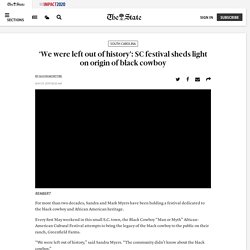
Every first May weekend in this small S.C. town, the Black Cowboy “Man or Myth” African-American Cultural Festival attempts to bring the legacy of the black cowboy to the public on their ranch, Greenfield Farms. “We were left out of history,” said Sandra Myers. “The community didn’t know about the black cowboy.” The Myers bought the 60 acres that would become their farm in 1991, after Mark Myers decided to pursue his dream of owning a horse ranch. “I didn’t look at it as a fond memory; but when I walked on the property, I had a connection,” Myers said.
When they moved to the farm, children in the neighborhood were surprised to see a black family with horses. “People had seen donkeys and mules but never horses,” said Myers. TV westerns popularized the cowboy in American homes but never depicted African Americans in these roles. If you go Read Next. The First Three-Time Derby Winner Was a Former Slave. Isaac Burns Murphy cased the track like Muhammad Ali did the ring, read thoroughbreds like Hank Aaron read pitchers and dominated Churchill Downs like Tiger Woods dominated Augusta National.
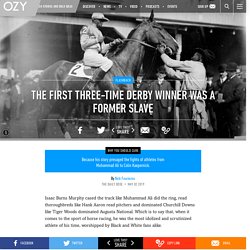
Which is to say that, when it comes to the sport of horse racing, he was the most idolized and scrutinized athlete of his time, worshipped by Black and White fans alike. Yet Murphy is obscured, whitewashed by a sport that wasn’t ready for his celebrity or his blackness. In a neglected cemetery lie black jockeys who helped create the Kentucky Derby. The headstones — cracked, chipped, crumbled — rise sporadically across eight acres of dried grass.
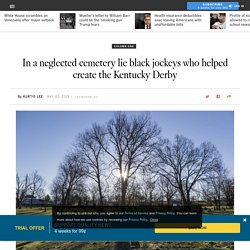
Mold and wind have eaten away at the slabs of stone, but if you kneel close enough, maybe wipe a palm across the faded inscriptions, family names emerge. Tucked off a quiet two-lane road lined by towering oak trees in Lexington, you’ll find African Cemetery No. 2, the burial site of many of Kentucky’s first — yet often least remembered — jockeys and horse trainers. The Forgotten Story of the African-American Cowboy. Photos: The Concrete Cowboys of Philadelphia.
The Concrete Cowboys of West Philadelphia. Race Horse Men Excerpt. An African-American Jockey Hasn't Won the Kentucky Derby for More Than a Century. Here's Why. In many sports, the professional athletes who broke through the boundaries placed around them for being African-American — like Jackie Robinson or Jesse Owens — have remained famous figures of American history decades after their physical feats first made headlines.
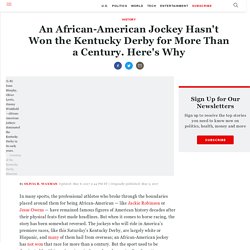
But when it comes to horse racing, the story has been somewhat reversed. The jockeys who will ride in America’s premiere races, like this Saturday’s Kentucky Derby, are largely white or Hispanic, and many of them hail from overseas; an African-American jockey has not won that race for more than a century. But the sport used to be dominated by African-American jockeys whose legacy is often forgotten. Perhaps the reason is that their early history with the sport was not the kind of thing that racing fans would prefer to remember. The Forgotten History Of African-American Jockeys.
Black Jockeys. Race Horse Men — Katherine C. Mooney. Listen to Katherine Mooney discuss Race Horse Men on WBUR’s It’s Only a Game: Race Horse Men recaptures the vivid sights, sensations, and illusions of nineteenth-century thoroughbred racing, America’s first mass spectator sport.
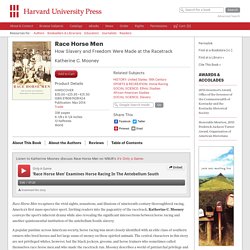
Inviting readers into the pageantry of the racetrack, Katherine C. Mooney conveys the sport’s inherent drama while also revealing the significant intersections between horse racing and another quintessential institution of the antebellum South: slavery. A popular pastime across American society, horse racing was most closely identified with an elite class of southern owners who bred horses and bet large sums of money on these spirited animals. Texas Ranch House . Black Cowboys. One of the most famous western black cowboys -- because he wrote his memoirs -- was Nat Love.
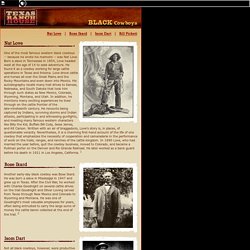
Born a slave in Tennessee in 1854, Love headed west at the age of 14 to seek adventure. He found it as a cowboy working for large cattle operations in Texas and Arizona. Love drove cattle and horses all over the Great Plains and the Rocky Mountains and even down into Mexico. His autobiography recalls many trail drives to Kansas, Nebraska, and South Dakota that took him through such states as New Mexico, Colorado, Wyoming, Montana, and Utah. In addition, he mentions many exciting experiences he lived through on the cattle frontier of the late-nineteenth century. Another early-day black cowboy was Bose Ikard. A History Of Black Cowboys And The Myth That The West Was White.
The Lesser-Known History of African-American Cowboys. In his 1907 autobiography, cowboy Nat Love recounts stories from his life on the frontier so cliché, they read like scenes from a John Wayne film. He describes Dodge City, Kansas, a town smattered with the romanticized institutions of the frontier: “a great many saloons, dance halls, and gambling houses, and very little of anything else.” He moved massive herds of cattle from one grazing area to another, drank with Billy the Kid and participated in shootouts with Native peoples defending their land on the trails. And when not, as he put it, “engaged in fighting Indians,” he amused himself with activities like “dare-devil riding, shooting, roping and such sports.”
Though Love’s tales from the frontier seem typical for a 19th-century cowboy, they come from a source rarely associated with the Wild West. Cheryl White was first out of the gate.